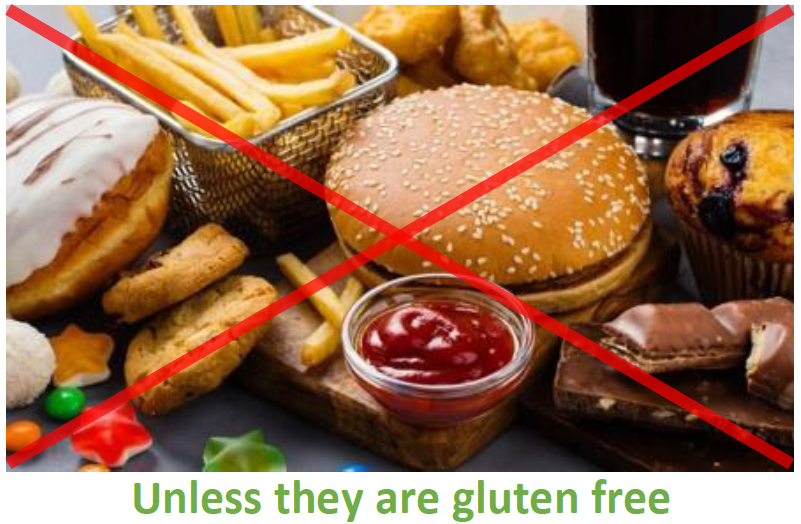The signs and symptoms for possible Coeliac Disease, gluten and/or wheat sensitivity.
A person can have one or more of the following:
What is Coeliac Disease/Gluten/Wheat sensitivity?
Coeliac Disease is a condition causing some adults or children to react to gluten, the protein found in wheat, barley, oats and rye. If a Coeliac eats gluten the lining of the small intestines becomes damaged reducing the Coeliac ability to absorb the nutrients from certain foods. This can lead to various symptoms and complications if undiagnosed.
Symptoms
Coeliac can experience one or more of these problems: diarrhoea, constipation, weight loss, chronic mouth ulcers, stomach pain and bloating, indigestion or bone pain. Also, flatulence, vomiting, nausea and symptoms similar to irritable bowel syndrome can indicate a need to be tested, which is a blood test.
Symptoms vary from person to person and may be constant or only occur from time to time. Some people will experience an itchy skin rash. The only treatment for both conditions is a gluten-free diet.
Foods to avoid: Breads, biscuits, cakes, pizzas, pasta, noodles, macaroni, potato croquettes, onion rings or chips from the chip shop, sausages & puddings, most regular breakfast cereals, communion wafers, processed suet, baking powder, ice cream cones, spelt, most soya sauces, foods in batter or crumb. Gluten free options are available such as gluten free bread and porridge.

Foods to eat: Potatoes, rice tapioca, sago, eggs, fresh meat, fresh fish, plain cheese, milk, tea, coffee, pure fruit juice, sugar, lentils, butter, margarine, cooking oils, jams & marmalades, fruit and vegetables. Wine, spirits and cider are also gluten-free.

We have found that 99% of people who contact us are negative on the Coeliac blood tests. In the past, research estimated that there are 300,000 in Ireland that are not “True” Coeliac, they are sensitive to gluten and/or wheat. Therefore, we recommend that if you have one or more of the symptoms listed above and your Coeliac test is negative, try a gluten and wheat free diet for 3 weeks. If the symptoms decline, we recommend that a person cut out gluten and wheat from their diet. If a person continues to eat food that they are sensitive too, it can inhibit their absorption of nutrients, which can cause low levels of absorption of essential nutrients, including Vitamin D which can lead to bone loss. All supermarkets have a gluten and wheat free section.
Calcium and Vitamin D information
It is very important that you do not take more than the recommended calcium amounts. It is essential that a person take Vitamin D to help absorb calcium.
How much calcium we recommend
0-12 months = 525 (non-breast fed infants only)
1-3 years = 500 mg per day
4-8 years = 800 mg per day
9-18 years = 1300 mg per day
Women 19 – 49 years = 1000 mg per day
Women 50+ years = 1200 mg per day
Men 19 – 49 years = 1000 mg per day
Men 50+ years = 1200 mg per day
How much Vitamin D we recommend
Babies 0-12 months breast fed or formula fed = 5μ/200 IU
Children 1-18 years = 10μ/400 IU per day
Adult women 19 – 49 years = 10-20μ which is equivalent to 400-800 IU per day
Adult women 50+ years = 20-30μ which is equivalent to 800-1000 IU per day
Adult Men 19 – 49 years = 10-20μ which is equivalent to 400-800 IU per day
Adult Men 50+ years = 20-25μ which is equivalent to 800-1000 IU per day
If you are on a calcium and vitamin D supplement, most people should not be taking any additional calcium from food or additional supplements. It is important to check your intake.
NOTE: Calcium alone is not enough to treat bone loss and is not a substitute for drug therapies that treat bone loss. Vitamin D3 is essential for calcium absorption.
Extensive blood tests should be done before starting any Osteoporosis treatment. The following tests we consider to be essential; Testosterone levels, PTH, Vitamin D, calcium, Kidney function, Cortisol and bone turnover markers. If there is a marked reduction in the level of male hormone in a young patient, then treatment with replacement male hormone testosterone may be appropriate.
Note: Patients on steroids or on certain immuno-suppressant therapy for cancer or aromatase inhibitors, should have a DXA scan and they should be treated proactively to prevent fractures occurring. They need to be taking calcium, Vitamin D3 and protein, preferably from food. Depending on their DXA scan results, causes of bone loss and medical history, will depend on which Osteoporosis medication is the most appropriate for them. Appropriate weight-bearing exercise is essential, and they should be monitored by repeat DXA scans, minimum every two years.